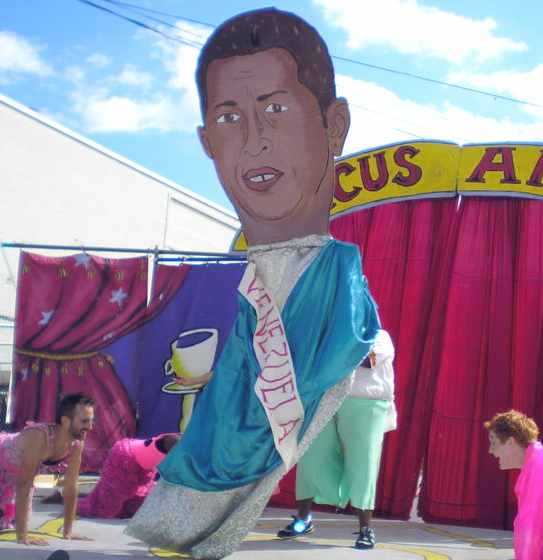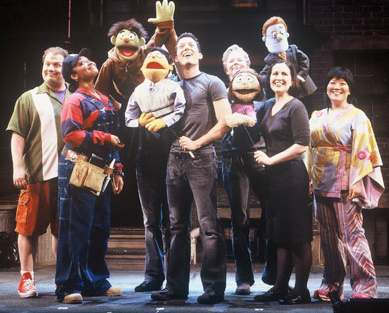|
PUPPETS
|
|||||
|
HOME | BIOLOGY | FILMS | GEOGRAPHY | HISTORY | INDEX | INVESTORS | MUSIC | SOLAR BOATS | SPORT |
|||||
|
A puppet is a made or found object, usually but not necessarily representing a character, used in play or a presentation. There are many kinds of puppet and they are usually sculpted or modelled, sometimes simple in the extreme, and sometimes highly sophisticated artifacts. A puppet may be operated directly by a puppeteer, or indirectly - by the use of strings, for example, or by other mechanical contrivance or even remotely by electronic guidance. Puppets moved by strings are also known as marionettes (from the medieval Passion play figure attributed to Marion or the young Mary, the mother of Jesus) or worn in costume. Puppets may also be animated by using stop motion animation.
Puppet of Venezuelan President Hugo Chávez
A general distinction between a puppet and an automaton is the former is mostly operated live and the latter is mostly programmed (for example a coin-operated automata-show or piano-roll sideshow figure).
History of the Puppet
Persian puppetry
There are two people involved in the performance: a musical performer and a person called morshed. The dialogue is between morshed and the puppets. The method of performance, its characters and the techniques used in writing the puppet show make it unique and distinguish it from other types of puppetry. Also, a new genre of Iranian puppetry emerged during Qajar era. Puppetry is still very common in Iran. Rostam and Sohrab puppet opera is an example of the most notable perfomance in modern day Iran.
Asian puppetry
Puppetry flourished in China, originally in pi-ying xi, the "theater of the lantern shadows", or, as it is more commonly known today, as Chinese shadow theater. In Taiwan, budaixi is prevalent.
Japan has many forms of puppetry. Perhaps the most internationally famous is the Bunraku, where the puppets are operated by three puppeteers in full view of the audience.
India, Java, and Thailand also have a strong tradition of puppetry. In Thailand, Hun Krabok, rod-puppet theater, is the most popular form of puppetry. In Vietnam exists mua roi nuoc, a water puppetry unique to Vietnam. In Java, wayang kulit, a form of shadow puppetry, is popular.
European puppetry
The roots of European puppetry grew from the commedia dell'arte tradition. Travelling performers who practiced this "low culture" art often performed in half-masks, or with puppets.
The strong Italian tradition of marionettes flourished in the 18th century, producing many skillful performances, including the tragedy Dr. Faust. Many of these marionettes survive to this day, and allow students of the art to marvel at their highly defined controls.
In the 19th Century, the marionettes of the master Pietro Radillo became even more complex. Instead of just the rod and two strings, Radillo's marionettes are controlled by as many as eight strings. The control over the individual body parts of the marionettes was greatly increased.
Another grand tradition, growing from the 19th century, is that of the opera dei pupi. This form of puppetry, made popular in Sicily, used rod marionettes, operated from above by a combination of strings and metal rods. The subject matter drew from the medieval epics of the Charlemagne knights. These ongoing dramas unfolded over many performances.
Elmo, a popular puppet from Sesame Street
Kinds of puppets
Kermit the Frog - famous puppet
Ventriloquist Edgar Bergen and his best-known "sidekick", Charlie McCarthy
Puppet Museums
Other uses of the word "Puppet"
The word puppet can mean a political leader installed, supported and controlled by more powerful forces, with no legtimacy in the country itself. In modern times this usually means no democratic mandate from the country's electorate; in earlier times, it could have meant a monarch imposed from outside, who was not a member of a country's established ruling dynasty, and/or was not recognised by its nobility. "Puppet government", "puppet regime" and puppet state are derogatory terms for a government which in charge of a region or country but only through being installed, supported and controlled by a more powerful government.
In a more general sense, a puppet is any person who is controlled by another by reason of undue influence, intellectual deficiency, or lack of character or charisma. Thus, drawing from the above meaning, it could be a political leader, who is a facade for more powerful forces working behind him, or it could be any person who is similarly doing what he is told to do.
Puppet can also be a term of endearment, similar to "love" or "dearie."
Another use of the word is on Internet message board communities, where puppet accounts are used for personal gain, such as on a forum game. An example is Anime Style Battling on many popular Pokémon websites.
Puppets can also be used to describe a small doll or toys commonly referred to as stuffed animals.
Science Fiction writer Robert Heinlein wrote "The Puppet Masters", a novel depicting alien parasites who are capable of attaching themselves to a human bieng and completely contolling him or her.
The word Poppet - originally no more than a variant spelling of "Puppet" - came to have Magical connotations, refering in folk-magic and witchcraft to a doll made to represent a person, for casting healing, fertility, or binding spells on that person.
Avenue Q's original Broadway cast. photo, courtesy of Avenue Q, LLC
LINKS and REFERENCE
Wishworks 13
Chandlers Mead,
Wishworks | Puppet Shows | Workshops | Parties | Stilt Walking Murals | The Players | Contact Us
A - Z FILMS INDEX
A - Z ACTORS INDEX
A taste for adventure capitalists
Solar Cola - a healthier alternative
|
|||||
|
This
website
is Copyright © 1999 & 2007 NJK. The bird |
|||||
|
AUTOMOTIVE | BLUEBIRD | ELECTRIC CARS | ELECTRIC CYCLES | SOLAR CARS |



